Revised Common Lectionary
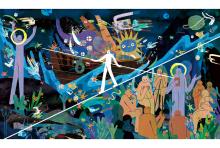
JEWISH NEW TESTAMENT scholar Amy-Jill Levine claims that all religions are a little bit supersessionist. Christian supersessionism — which understands God’s covenant with Christians to nullify God’s covenant with the people of Israel — has been so mainstream throughout most of Christian history that it has hardly required articulating. It was just the anti-Jewish water in which we swam. Following the Holocaust, however, Christians recognized how much we’d weaponized supersessionism into antisemitism, which provided support for Nazi and white supremacist ideologies and perpetuated anti-Jewish violence. Unfortunately, Levine argues, no exegetical maneuver can fully expunge supersessionism from the New Testament — though many have tried. It’s there. And the authority of God’s word in Christian lives keeps its dangerous power ever-present.
Still, Paul’s letter to the church in Rome (which we read this month) contains Paul’s own grappling with these questions. Chapters 9 to 11 — wherein Paul corrects some of the Gentile converts who think God has now rejected the covenant with Israel — comprise the hook on which most contemporary attempts to dismantle supersessionism hang their hat. So, we’ll pay special attention to these.
This isn’t going to be an easy fix — particularly for Christians (like me!) who want to hold fast to the gospel, atone for complicity with antisemitism, and stand in solidarity with Palestinians under occupation. Still, I trust God’s promises: I believe both that God’s covenant with Israel endures and that Jesus is the Messiah. So, this month, we are going to sit with the discomfort of failing while attempting the impossible. Because, in trying, we might find a new way through.

There are large swaths of the Bible that the lectionary skips over. And while there are lots of reasons for not including certain passages, it doesn’t take too long to notice one major pattern: Passages that are uncomfortably violent (or just angry) are frequently left on the cutting room floor, and consequently left out of Sunday worship.

PUBLIC EDUCATOR AND philosopher Cornel West has spoken about the difference between optimism and hope. Optimism, as he understands it, can point to empirical evidence that suggests things will get better, while hope can exist without any of that. Even when nothing around us points to a bright future, hope defiantly holds on for a better day. Baptist minister and social ethicist Miguel A. De La Torre argues in his book Embracing Hopelessness that hope is often used as a tool of oppression and pacification. For him, hopelessness can be an animating force for justice because a deep enough dissatisfaction with the status quo will move us to change it.
I find resonance and challenge in both of these dear teachers’ perspectives. Very little of our time suggests that things are progressing the way they should. The status quo is untenable and must be changed. Both perspectives remind us not to trust or be satisfied with the way things are. We must find motivation to build the world we need rather than accepting the one we have. For many Christians, October begins with World Communion Sunday and ends with All Hallows’ Eve and Reformation Day. We celebrate our eucharistic ties to Christians around the world, recognize the great cloud of witnesses and saints who have gone before, and commemorate one of the many movements in church history that have pushed us toward something new. We live in a time when very little resembles what we knew just a few years ago. How might our texts help us build for what is coming?

TO WHOM DO our lives belong? The Barmen Declaration, written in 1934, was a theological statement by a small group of German Protestants in response to the growing pro-Nazi movement within German Christianity. It stated, “We reject the false doctrine, as though there were areas of our life in which we would not belong to Jesus Christ, but to other lords—areas in which we would not need justification and sanctification through him.” The signers of the Barmen statement said this because the confederation of German Protestant churches (which would eventually become the state church under the Nazi Third Reich) was demanding allegiance to the state in all areas of life and faith. The close of Eastertide gives us an opportunity to consider, in our own time and place, to whom we belong and what that means for how we live now amid echoes of authoritarianism.
In this season, we read of Jesus’ growing influence and what it meant for his disciples to reckon with a world in which resurrection is possible. If the threat of death is muted, if not even prison can contain the good news, then how emboldened will a small-but-mighty movement become in the face of a powerful empire and its proxies? Can this good news still reach us—we who are worn from the immense grief of the last two years? Can we find our second wind to share this good news and build God’s reign? I believe Eastertide has a particular resonance for these times.

WE TEND TO approach Lent passively. Some of that is appropriate. After all, we start Lent by putting ashes on our heads to symbolize our grief, and grief often makes us more still. But Lent is a season of intentional activity. To repent is to shift course. We continue to move, but in a different direction. We walk with God, following where God leads, no matter what we must leave behind.
This journey eventually leads to the cross, and later to resurrection. That’s when we find the journey has just begun. We were made to seek God, to question, to be in tension with mystery, to wrestle with God like Jacob, and to eventually find what we’re looking for. And when we come into contact with God in whatever ways are possible, we realize we cannot serve this God as one would serve an idol. We cannot operate out of empty ritual or rote adherence to any custom. We can’t appease or bribe this God. This God is not confined to our shrines, nor does God thrive off our material gifts and sacrifices. What this God wants is much more profound: repentance, trust, and a complete reorientation of one’s heart away from self and toward companionship with God. Many who’ve prepared to walk the Camino de Santiago pilgrimage did so by training on their own trails for months before making the trek. Lent similarly trains us for a lifelong journey of resilience, trust, and resistance to the forces of evil and despair.

A CURIOUS THING happened among many congregations in my very white denomination after George Floyd was killed: Churches that had been at best timid to enter the work of racial justice dove into it headfirst. Colleagues dusted off their blogs to share their thoughts. Church leaders laced up their sneakers to participate in marches. It appeared that a reckoning had occurred for countless people in the faith. They finally got it and could no longer stay silent, not while a global pandemic amplified the existing inequities in our society. It was time to act.
This would seem like good and right action, except many began this work having previously wounded leaders of color who’d tried for years to call them into it. Worse yet, there was little to no attempt to remedy their errors or circle back with the people they’d hurt. They were eager to move toward action but had to be reminded that the past still needed to be addressed before the future could be entered with justice.
If there is a “right” way to approach Lent, it involves holding our past and future in tension. The Greek words for repentance and reconciliation both connote a reciprocal change. The person on a wayward path makes a U-turn. The transgressor trades places with the transgressed. Our texts challenge us to examine who we have been, are, and are willing to become, because all of it matters to the future we will build.

I’M NOT SURE where I thought we would be by now, but I didn’t think we’d be here. A global pandemic has ravaged and killed too many of our loved ones to name, though we could have contained it through collective measures. Climate change continues unabated despite decades of warning and appeal, and we may have missed our window to prevent its worst impacts. We’re experiencing perils that are unnecessary and completely caused by our selective will.
Christmastide and the Epiphany season are opportunities for us to recall and perhaps draw hope from the story of God’s inbreaking into a desperate human condition. But we must also remember that, despite God’s extraordinary proximity to humanity in those days, trouble persisted. Jews were still under a repressive occupying power. They were worshipping in a temple built by a leader invested in his own oppression, put in power by their oppressor. Very little seemed to change. If anything, it appeared to get worse.
As with the people in those times, so it is with us today. We who read the text get a peek behind the veil of worldly power to see what God was doing in the shadows. We see what was obscured from those who cried to their Creator or who’d perhaps run out of tears to shed. We see what they could not see at the time. The preacher and teacher will need to pull back anew this curtain for the people—and for self.
PASSAGES FROM THE book of Hebrews show up in the lectionary every Sunday this month. In Ernst Käsemann's landmark book The Wandering People of God, written in the context of 1930s Germany, this pastor and theologian characterizes the community described in the Epistle to the Hebrews as a people who wander in the wilderness of this world. “The basic posture of the bearer of [God’s] revelation should, in fact, be described as a wandering,” Käsemann writes; “the attitude of faith can only be described as wandering.” He locates the identity of the church in the biblical stories of Israel in the wilderness—the church as a people estranged from imperial power.
“I of course had in mind that radical Confessing Church which resisted the [Nazi] tyranny in Germany,” Käsemann wrote decades later, reflecting on his book as anti-fascist ecclesiology—a biblical theology for a German antifa church movement. When a society coheres around a nationalist identity that designates segments of the population as “other” and therefore a threat to patriotic unity, “the church must appear as a band of deserters.” To desert such nationalistic ideologies is to wander in search for Jesus because, according to Hebrews, he appears at the edge of society, outside the civic union, beyond the border—Jesus as the one who suffers “outside the city gate,” on the other side of the wall (Hebrews 13:12).
The last chapter of Hebrews invites the faithful to solidarity with Jesus, which involves a commitment to excluded people, to scapegoated populations: “Let us then go to him outside the camp and bear the abuse he endured” (Hebrews 13:13).

MOST OF THE friends I grew up with in church youth group don’t call themselves Christians anymore. They left church behind years ago. Yet here I am, still a very churchy Christian. Why have I stayed in the faith after all these years? Why do we keep doing this Christian thing?
We are tempted to convince ourselves that God will reward our faithfulness with blessings—either in this life or the next. This is a Christian logic as old as the Bible, a theology taken from the lips of Jesus himself: “Your Father who sees in secret will reward you” (Matthew 6:4). Prosperity theology isn’t an aberration but a perennial Christian impulse, an urge within all of us as we try to justify to ourselves our faith.
This way of thinking about beliefs, according to Meister Eckhart, turns God into a cow. “People look upon God with the eyes with which they look upon a cow,” he preached in the 14th century. “To love God the way they love a cow, because it gives you milk and cheese. This is how people behave who want to love God because of external wealth or inner comfort ... they love their self-interest.”
This month’s stories from Mark’s gospel invite us into the disciples’ struggle to understand why they’ve chosen to follow Jesus. Discipleship, we’ll discover, is a constant exposure to the selfish motives for our faith as we stumble into God’s truth—that, as Eckhart preached, “God loves us without a why.” God loves us without a reason, without making calculations. God loves us because God loves us.
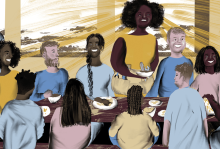
WE LONG FOR new beginnings, a restart, to go back in time to correct our mistakes or dodge the harm someone has done to us. But those former lives are inaccessible to us. All we have is this life now. Here we are in the middle: after the beginning and before the end. Usually we associate “middles” with “stuckness”—not the excitement of the new and not the relief of an end but locked in between. For example, the morass that prompts a midlife crisis, that languorous experience of the middle of life that leads to the purchase of a motorcycle.
In the church calendar, we’re in the season called “ordinary time,” a long stretch of weeks between Pentecost and Advent. These are the middle months where the scriptures plop us into the middle of stories. And that is where we find Jesus. The incarnation is an act of God in the middle of Israel’s story: not the beginning, not the conclusion, but God-with-us in the middle. This season of unceasing tedium has also been taken up into the life of God. Perhaps we could describe the incarnation as the midlife crisis of God?
Jesus is the one who has been with us from before the beginning, who has witnessed the groaning of all creation, the births and deaths and the life in between—and comes to us now, where we are, in our midlife, with our regrets and unfulfilled dreams, and guides us as we wander into the ordinary goodness of life.

GOD IS NOT a neutral observer of our worldly affairs. “God takes sides,” the Brazilian theologians Clodovis and Leonardo Boff explain in Introducing Liberation Theology. God is not a dispassionate consultant, nonpartisan mediator of divisions, or a disinterested negotiator of political antagonisms. “God takes sides and comes on the scene as one who favors the poor,” Mexican theologian Elsa Tamez writes in Bible of the Oppressed. “The God of the biblical tradition is not uninvolved or neutral,” U.S. theologian James H. Cone argues in A Black Theology of Liberation. “God is active in human history, taking sides with the oppressed.”
God has already decided to live in solidarity with people who have survived injustice after injustice. The incarnation reveals the partisanship of God—that, in Jesus, God becomes one of the “disinherited,” to use Howard Thurman’s language. The life of Jesus is the story of how God takes the side of “people who stand with their backs against the wall,” as Thurman puts it in Jesus and the Disinherited, populations “disinherited from participation in meaningful social process,” groups segregated from “any stake in the social order.”
The Bible passages this month call us to examine where we stand. They illumine the borders of power—the divide between privilege and oppression that slices through our communities—and prod us with a question: Which side are you on?
FOLLOWING JESUS IS a mindset, a way of thinking as much as a way of being. In fact, one is not able to “be” a Christian without having a “change of mind,” a metanoia, the Greek word used in the New Testament for “repentance.” This change of mind or repentance, however, does not come from debates or argument. Rather, becoming like Christ is trying to figure out what it means to be one of his followers. “Lord, I want to be a Christian in my heart,” says the “Negro” spiritual. Depending on the version, the songwriter chooses to “be more loving,” “be more holy,” and “be like Jesus” for the verses that follow.
It may be fitting that we do not know who wrote this song or where it originates, except from the hardscrabble lives of enslaved people in the U.S. Imagine with me what it might have been like to sing these words under such suffering and brutal conditions in order to uphold a horrific system. But instead of reflecting passive acceptance, these words might have been a means to shore up enslaved persons’ souls so they could live antithetically to that system. It certainly works that way for me, in the face of death-dealing encounters and events. This month’s texts give us an opportunity to not only sing this song, but to meditate on it and do our best to practice it. Maybe we will become more Christian in our hearts and in our actions. We will have to want it.
October 4
Sharing in the Suffering
Exodus 20:1-4, 7-9, 12-20; Psalm 19; Philippians 3:4-14; Matthew 21:33-46
WHAT DOES IT mean to share in Christ’s suffering? I’ve bandied this question around in my mind for some time as I have pondered the Philippians text. Paul, of course, had shared in persecuting early believers before he became a convert himself. Trying to make sense and meaning of that suffering and people’s losses must have been a constant project for those trying to encourage the early church. Here, Paul takes on what it has meant to “lose everything.” His pedigree is impeccable; his credentials unassailable; his attendance to the law, meticulous. And yet, none of that matters to him after he committed to “knowing Christ Jesus” (verse 8). Those things—status and power—are on the trash heap as far as he is concerned. But what comes in its stead is suffering, even as he longs to “know Christ and the power of his resurrection” (verse 10). For Paul, you can’t get to the power of the resurrection without sharing in Christ’s suffering. But what does that mean?
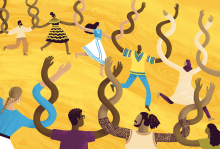
EACH OF THESE reflections was written separately, not taking the others into consideration while writing each one. But as I reread them, there is a thread here. It is the thread of what it means to live faithfully together; what it means to do right by one another. Reflecting on love, accountability, economic justice, and what it means to have a righteous mind, I found myself thinking of each text in communal ways, rather than the ways I confess to typically having thought of them: “What do they mean for me, the individual?”
I am more struck by the selfishness I see, in these extraordinary times, when some people flat out refuse to do anything that they believe infringes on their individual rights. I believe that as followers of Jesus we are charged—called—to go beyond ourselves, even if we are socialized differently in our cultures or families. In addition, it is easy to settle into devotions that do not look beyond our own spiritual growth. But in these reflections, I have pushed myself to think about what it means to take in a larger view, to extend personal spiritual growth into the community. In some ways I am trying to reflect the Zulu concept of ubuntu, which indicates that a person is only human in relation to other humans. For me, by necessity, that means we must reach beyond ourselves. I hope these reflections will take you to that kind of humanity which, I believe, will deepen your faith in Christ.
September 6
The Love Debt
Exodus 12:1-14; Psalm 149; Romans 13:8-14; Matthew 18:15-20
“LOVE” IS A landmine word. It has come to mean expressions of sappy, gooey sentimentality. Because of this expectation, requiring the hard “verb” of love as a Christian commitment often gets dismissed. “Owe no one anything, except to love one another, for the one who loves another has fulfilled the law” (Romans 13:8). Every bit of the Romans text requires something more than good feelings. It calls us to examine our Christian debt. To “do no wrong” in a world where wrong stalks so many means we have to figure out how to “right the wrong.” What can it mean to “owe no one anything but love” when this nation robbed Indigenous Peoples of land and livelihood? It would be easy to say, “That was so long ago,” except the effects of that robbery extend into our present time.
It’s easy enough to name the damage, but how do we repair it? What does it mean to say, “Love does no wrong to a neighbor” (verse 10), when our trans siblings are being murdered and dismembered (as in the case of Dominique Fells in Philadelphia)? How do we provide safety? What does “Love your neighbor as yourself” (verse 9) mean in this Black Lives Matter moment of our culture, as we grapple with centuries-old sin against Black humanity? If we in fact owe one another love, then we owe one another justice, which includes repairing the damages done, individually and collectively, in community. It literally means reparation. It means doing so with an urgency, if we in fact believe “salvation is nearer to us now than when we became believers” (verse 11). For some, longing for Christ’s return can be an invitation to ignore the pain of now; but for me, it is the exact opposite. We are called to live honorably, which means to love righteously by “putting Christ on” (verse 14) and being the active love of God in the world by our deeds. Otherwise, it is not love.
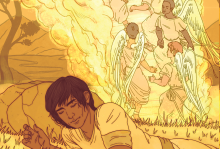
RECOUNTING THE STORIES that shape our religious longings happens in the shade of uncertainty and fear. We remain in “Ordinary Time” but are besieged by a global pandemic with fallout the likes of which we cannot yet know. It would be easy to scapegoat people or to descend into fear. But we are called to live out our faith, even in difficult times—or maybe especially in difficult times.
We know we are constantly being shaped by our histories, in every way. Telling the stories of how we’ve come through in the past and grounding ourselves again in the firm foundation of our faith will, over time, reveal to us how that foundation shaped our lives in this season. It may embolden us to join God’s project of salvation, deliverance, and freedom for all creation. With Christ at the center of our lives, we have a constant invitation to return to the source and to center our lives in God in such a way that we see our responsibility to live, on behalf of this world, in the name of Christ. It pushes us beyond our circles of family and friends and helps us to see a larger connection, deeper relationships. Perhaps if we can get there, we will be able to see our need to repent from our self-absorption. We might be able to see that we are a web of relationships and—just as Moses needed the help of at least five women—that we need one another to survive.
August 2
Wrestling a Blessing
Genesis 32:22-31; Psalm 17:1-7, 15; Romans 9:1-5; Matthew 14:13-21
IN GENESIS 32, Jacob wrestles a blessing from the man at the river Jabbok, but not without cost. Jacob says he’s seen God face to face (32:30), something Moses would later be told is impossible. There has been much scholarship on whether the man with whom Jacob wrestles is God or an angel. The text is fully ambiguous. But it seems clear that Jacob wrestled in the night because he was afraid to face his past. He feared the coming confrontation with Esau.
I have had internal wrestling matches that have felt like I was in hand-to-hand combat with myself. Lately, I’ve been wondering whether our nation can wrestle with its internal beginnings, with its demons and angels—with its past. Recent events where Black people have died either in vigilante killings, such as Ahmaud Arbery in Georgia, or state-sanctioned police killings, such as the murders of Breonna Taylor and George Floyd, tell me we still have some communal wrestling to do, in hopes of finding a new name that includes “justice.” Jacob needed to win because from his lineage would come the patriarch from whom came the messiah who “God blessed forever” (Romans 9:5). If people will know God’s blessings, they must find a way to live into what is right for the sake of us all.

EARLY ON IN my training for hospital chaplaincy the spiritual care director asked each student to choose a biblical role model of faith. I chose the Apostle Paul. It wasn’t an obvious choice for someone raised as a feminist and aware of the damage done to women through interpretation of Paul’s letters and those attributed to him.
Despite that, I love the way Paul’s faith and humanity shine through his words. Even in his letter to the Romans, one of Paul’s last and most-polished, we have a sense of his limitations. He mixes confidence and humility, offering an unflinching look at sin: collective sin and the sin that is particular to each of us, broken beloveds of God.
I need Paul’s writing on sin so that I don’t grow too self-righteous. When Paul writes that we received God’s grace “while we were still weak” (Romans 5:6), I am reminded that I can’t claim righteousness before God on my own. It is only when we have an honest estimation of ourselves and our capabilities that we can engage in justice work without moralizing or neglecting to set good boundaries.
Taking sin seriously means not only fighting back against oppression but taking a hard look at myself. In my feminism, am I aware of and working to end the ways misogyny particularly oppresses black, brown, Asian, and Indigenous women, as well as queer and trans people? Do I put my own concerns first or truly seek liberation for all people?
June 7
With Us Always
Genesis 1:1-2, 4; Psalm 8; 2 Corinthians 13:11-13; Matthew 28:16-20
READING THE CREATION story in Genesis, I imagine myself deep inside a dark place, with the breath of God like a gust of wind. I recall James Weldon Johnson’s poem “The Creation,” especially as it is read by James Earl Jones in a short film featuring animated clay art by Joan C. Gratz. The darkness through which God births the world is “blacker than a hundred midnights / down in a cypress swamp.” From that rich blackness comes the countless colors of the myriad creatures that dwell on the earth.

THE HOLY SPIRIT has a starring role leading up to Pentecost, not only on the day itself. Jesus prepares the apostles to receive “another Advocate.” Other readings jump forward to what occurs when disciples are filled with the Holy Spirit. This could be an unusual level of holiness meant for a few, but it sounds like a holiness to which we can all aspire. Stephen and the apostles were granted heavenly visions or the ability to speak new languages. The challenge for believers today is to recognize when the Spirit of truth “comes upon” us.
A clue might be found in how Jesus describes the approach of the Holy Spirit to the disciples (Acts 1:8): This verb (eperchomai) conveys the sense of moving from a transcendent position toward one who is less powerful. The writer of Luke-Acts also uses the verb in this way when Gabriel answers Mary’s question about how it could be that she will bear the Messiah.
Mary, the apostles, Stephen, and others weren’t powerful to begin with. It is the Spirit who empowered them, who made risky discipleship possible. And the “signs and wonders” (Acts 5:12) that flow from being full of the Spirit aren’t always spectacular. We could be filled with the Spirit when we turn a vacant lot into a community garden. Or when we register new voters. Or furnish a home for a family seeking asylum. We don’t need a certain level of education, status, or holiness to live into Jesus’ promise that his followers can receive power to do great works (John 14:12).
May 3
Churches ‘Heal’ Debt
Acts 2:42-47; Psalm 23; 1 Peter 2:19-25; John 10:1-10
AMID “SIGNS AND wonders” by the apostles, Acts 2 describes how early Jesus followers provided for each other by selling off possessions and goods, praying together, sharing meals, and holding property in common. That may seem an impossible ideal.
But sharing resources beyond our individual household can be creative while supporting communal stability and security. The early Christians intertwined worship with economic relationships and forged bonds of community. Congregations can do this in diverse ways.
Several Chicago-area congregations have helped to raise money for canceling medical debt through a nonprofit organization called RIP Medical Debt. RIP uses the same method as debt collectors—it buys debt in bulk from brokers at a deep discount—except RIP then collects donations to clear the debt. Individual contributions as small as 50 cents or a dollar from people in the pews together wiped out thousands of dollars of medical debt, freeing a family. Members of the participating congregations rejoiced in worship that they could relieve financial stress, even while many of them also had such debt.

OUR LECTIONARY REFLECTIONS for April encompass Palm Sunday and three weeks of readings for Easter. I found these scriptures deeply moving as they presented Jesus of Nazareth through different eyes and in different contexts.
One spring many years ago, our small Mennonite church near Chicago centered our worship services from Easter to Pentecost on stories of Jesus’ resurrection. It was my first experience of “Eastertide,” and I never forgot it. Each week we focused on a different resurrection account in the New Testament—one from each gospel (two from Luke) and 1 Corinthians 15. Comparing different perspectives, our services highlighted the many witnesses to a singular, unexpected event that can help convince us today that this crucified prophet has been resurrected and exalted as Messiah and Lord (see Philippians 2:9-11).
Two more thoughts: First, in the passages below we unfortunately miss the terrifying events after Palm Sunday, during which Jesus confronts the Powers—both high-priestly and Roman—that want to get rid of this “King of the Jews.” Jesus was crucified as a political threat. To accept the risen Jesus as Lord is to take on the (often political) struggle between good and evil in our current contexts.
Second, our faith is not just spiritual. Jesus’ bodily resurrection speaks of the value God places on physical bodies. Though Jesus was black-haired and brown-skinned, God loves all shades and shapes of bodies. Through Jesus’ resurrection, we catch a glimpse of the age to come. It may indeed be, as C.S. Lewis characterizes the new Narnia, deeper and more solid than our present age.
April 5
A Risky Donkey Ride
Isaiah 50:4-9; Psalm 118:1-2, 19-29; Philippians 2:5-11; Matthew 21:1-11
ABOUT 40 YEARS after the original “Palm Sunday” in Jerusalem, the Jewish historian Josephus wrote a history called The Wars of the Jews. In it, he described the welcome received by the Roman Emperor Vespasian when he returned to Rome after destroying Jerusalem and its temple.
The Romans were so fired up that many exited the city to meet him: “The whole multitude ... came into the road and waited for him there.” With great joy, “they styled him their Benefactor and Savior.”
In contrast, Jesus’ “triumphal entry” into Jerusalem parodies the ancient tradition of a victorious king welcomed home to his city after a battle. Rather than riding a white horse, the Middle Eastern Jesus borrows a donkey (Matthew 21:2). Although a large crowd of outsiders created a path for him with cloaks and branches, Jerusalem’s citizens have one startled response: “Who is this?” (verses 8, 10). But even his followers do not call him a king; he is “the prophet Jesus from Nazareth in Galilee” (verse 11).
Rather than a victorious welcome such as Vespasian received, Jesus knows he is raising the stakes in a land as sharply divided as our own. He must nonviolently challenge the corruption that lies at the core of its leadership—Caiaphas and other chief priests who negotiate with Rome for their own interests. Jesus of Nazareth knows his dramatic action will likely result in his execution, but to honor God, he must take the risk.
Only after these Jerusalem events can the “daughter of Zion” go back to her scriptures and find texts such as Zechariah 9:9 where “your king is coming to you, humble, and mounted on a donkey” (Matthew 21:5). Or the song of victory in Psalm 118: “Blessed is the one who comes in the name of the Lord ... bind the festal procession with branches!” (verses 26-27).
Later believers can sing a hymn to their Messiah Jesus (in Philippians 2:6-11), who had “humbled himself to the point of death” and then became exalted above every other human as Lord.
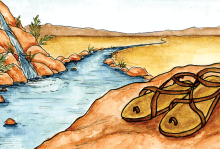
ON THE CHURCH calendar, the entire month of March is devoted to Lent—a period of self-examination as we follow Jesus on his journey to Jerusalem to confront the powers who have usurped Yahweh’s temple for their own purposes. Examining our own motives and desires, our private resentments and need for control, is one of the hardest tasks we can ever do. But there is no better time than Lent to deal with our own egos as honestly as possible. Time and time again I hear of family members or friends who are estranged from each other over money matters or misunderstandings. It reminds me of C.S. Lewis’ story The Great Divorce, when various characters would rather take the bus back to hell than reconcile with a brother or sister.
Besides interpersonal relationships, there are societal sins in which we participate. What is our responsibility to the community in which we live? What policies would best help the homeless or relieve unnecessary cruelty in the criminal justice system? How much should we change our lifestyles because of impending climate change? How does love of money and power affect our relationship with Jesus who laid them aside to identify with “the least of these”? Our lectionary readings for this Lenten period of self-examination range across both testaments and different genres of literature. References to sin and law are prominent—but so are the antidotes: confession, repentance, forgiveness, and grace.
March 1
Repentance Is Hard
Genesis 2:15-17; 3:1-7; Psalm 32; Romans 5:12-19; Matthew 4:1-11
TEMPTATION, SIN, CONFESSION, repentance, and forgiveness—or resisting temptation from the start? For those who engage Lent as a time of self-examination, these readings provide two examples, one from each testament. Psalm 32, attributed to King David, most likely refers to his own sins of adultery and murder. But after David repented and experienced forgiveness, he was able to eloquently express both the misery of the conviction of sin, and the rush of relief and wild joy that accompanied confession and repentance. You would think people would try repenting more often.
In Matthew 4:1-11, we learn that even the most intense temptations were resisted by Jesus, the “Son of David.” In the wilderness, Jesus confronted the voices within. “Use your power for yourself!” the tempter urged. “Change these stones into bread—like Yahweh made manna in the desert!” “Show your power to those big shots in Jerusalem! Then come up the mountain, and I will show you all the kingdoms of the world. They can all be yours ... if you worship me.” Don’t think the human Son of David did not struggle hard against these thoughts. At that very moment, Roman soldiers were occupying his land. What aspiring king, president, or politician could have turned down such an offer?
Truly repenting of sin is hard. Resisting temptation is hard. When have you repented of a sinful act and found forgiveness? When have you found the support—of friends or angels—to resist temptation?

CHRISTMAS OFFERS AN opportunity to reflect on how well we know Jesus as he would want to be known. Can we be the kind of Jesus followers we should be without an adequate understanding of who Jesus really is? Only a good grasp of who Jesus is offers a solid foundation for our worship and service in the new year.
For many, this Christmas Jesus is a beautiful baby boy wrapped in swaddling clothes, sleeping in a trough on a bed of straw, as farm animals and shepherds look on pensively. Another common scene of tranquility is one of the baby Jesus in the arms of his mother Mary—the Madonna and child portrait so prominent throughout church history. In many ways, these depictions are appropriate for the Christmas season, but there is a potential problem. For many, these are the defining images of Jesus: helpless, dependent, silent.
This is not at all the person of the Messiah who is announced in the Old Testament. What was the expectation that gripped the Jewish people for centuries? What was the Coming One to do? How would he change the world as they knew it? How can he change the world as we know it?
These readings explore prophetic passages that describe the One who was to come. How does the New Testament celebrate Jesus as that long-expected Messiah? How can his coming help us to live out our faith well?

THIS NOVEMBER CYCLE of lectionary readings encourages our stillness and trust in God in times of persecution (Psalm 46). It also asks us to reconsider the signs and wonders of Jesus’ public ministry as an invitation into his redemptive plan.
In Luke 19, Jesus extends mercy in the form of table fellowship to the wealthy and despised chief tax collector Zacchaeus, setting off alarms. Everyone who saw divine hospitality in motion “began to grumble and said, ‘He has gone to be the guest of one who is a sinner’” (verse 7). The taxation system of which Zacchaeus is a part, by profession and association, is no doubt inherently corrupt and socially abusive. Ironically, salvation comes to Zacchaeus with “breaking of bread,” table fellowship, and in the context of divine hospitality.
Luke 20 presents one of several vignettes that raise questions about the nature and origin of Jesus’ authority. Here a dispute pits Sadducees, the keepers of the Torah who do not believe in resurrection, against Jesus, the rabbi who scrambles and puzzles their logic. What is revealed is a strictness of theological imagination on the Sadducees’ part and radical truth-telling grounded in well-timed perception on the part of Jesus. Then in Luke 21, Jesus foretells terror, the kind which we 21st-century, world-redemption seekers would do well to hear: “Nation will rise against nation, and kingdom against kingdom; there will be great earthquakes ... famines and plagues ... and great signs from heaven” (verses 10-11). You will be hated, Jesus says, but “by your endurance you will gain your souls” (verse 19).